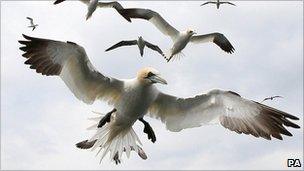SNH to assess Western Isles gannet harvest licence
- Published

Young gannet were once harvested on other Scottish islands, including Orkney
Permission for the harvesting of young seabirds will be reviewed as part of a wider assessment of a government agency's licensing functions.
Thousands of gannet chicks are taken from the island of Sula Sgeir, north of Lewis, to be eaten as a delicacy.
Scottish Natural Heritage (SNH) said the traditional guga hunt in its current form was sustainable.
However, it added that the issue would be considered in detail during the review over the next 12 months.
The harvest on Sula Sgeir is Scotland's surviving guga hunt.
Animal welfare charity the Scottish SPCA has renewed its call for it to be banned.
The organisation said the method used to kill the birds was cruel.
SSPCA chief superintendent Mike Flynn said: "These birds are killed by being struck on the head with a heavy implement.
"This is an abhorrent method of slaughter which should be banned."
He added: "We are concerned that many of these birds will not be killed by a single blow.
"Causing any of these birds unnecessary suffering would be an offence and, as such, we would expect future licences to be denied."
SNH said the hunt was a licensable activity under the Wildlife and Countryside Act.
It said just over 9,000 pairs of gannets were recorded on Sula Sgeir in 1984, 10,000 in 1994 and about 9,000 in 2004.
A spokesman said: "It is a legal activity and has been carried out for generations.
"The licence for the hunt includes a condition to ensure the birds are humanely dispatched."
He added: "We will be reviewing our licensing functions over the next 12 months during which this issue will be considered in more detail.
"Any recommendations arising as a result of this work will be implemented with immediate effect."
'No threat'
Western Isles SNP MSP, Alasdair Allan, said he has written to SNH urging the agency to allow the hunt to continue.
He said: "The guga hunt on Sula Sgeir is the only remaining one of its kind in the Scotland and plays a significant role in the culture of the Ness area of Lewis.
"I believe that SNH's initial assessment is right, which is that the hunt in its current form is sustainable."
Mr Allan added: "I respect the fact that there are many others who disagree with me, but I am satisfied that the hunt presents no threat to the future of the species and it is currently licensed to include a condition that the birds are quickly and humanely dispatched."
Similar harvests have taken place on the Faroes, Iceland and in the past on Orkney and St Kilda.
The meat is described as grey, strong smelling and salty.
- Published25 August 2010